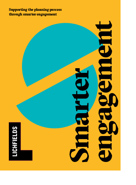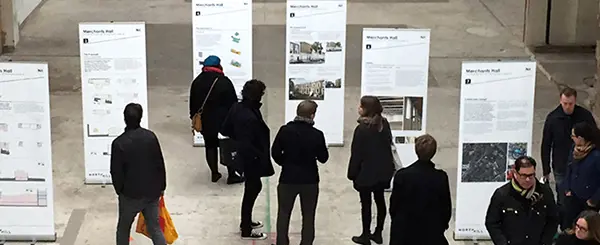Public participation in town planning is not new and for plan making this has been a statutory requirement for a long time. However, in relation to development proposals, whilst not mandatory in England
[i], there is now a greater emphasis on public engagement early on in the planning process and before a planning application is submitted
[ii]. Pre-application consultation with the public and stakeholders is mandatory for a wide range of projects in Scotland and Wales (and in Northern Ireland) and for ‘Nationally Significant Infrastructure Projects’ in England; at some point in the future, pre-application consultation may become a legal requirement for a much wider range of projects in England.
The Conservative Government’s 2010 manifesto centred on the ‘Big Society’, which in part sought to devolve power to local government and encourage people to take more of an active role in their communities. The Localism Act 2011, the National Planning Policy Framework and national Planning Practice Guidance all set out how this should be achieved: they have put community empowerment and engagement high on the agenda. Many local authorities also have their own requirements for consultation which they set out in their Statements of Community Involvement. In response to this, developers are increasingly expected to carry out community engagement and pre-application discussions, particularly for major schemes. In our experience, they willingly do so in the interests of securing a better development and a more streamlined planning process.
The central message is to be proactive rather than reactive when it comes to engagement. For too long, community engagement has been perceived as a costly and time-consuming tick-box exercise. But if targeted properly and fully integrated into the planning process, it can be cost-effective, improve a scheme and help achieve a successful planning outcome.
Lichfields' five point plan for smarter engagement
Our aim is to develop an engagement strategy that suits our client’s business objective, their project and the budget. Building on this, we develop a strategy which draws on a range of tools and a wealth of project experience, to help secure support for a scheme and neutralise potential objections.

Lichfields is at the forefront of effective engagement and has a dedicated team of experts who are on hand to provide advice and help tailor appropriate engagement strategies. Our five-point plan for smarter engagement sets out simple but important steps which we follow for clients. I consider this below.
Point 1. Define objectives
From the outset it is important that we understand our client’s objectives: what needs to be achieved, by when and within what budget. From our wide understanding of the planning and development sector, we can help define objectives and through smarter engagement, achieve them.
Point 2. Identify the stakeholders and determining issues
It is important to understand who we need to engage with and why, so that the ‘Smarter Engagement’ strategy can be shaped accordingly. We have a range of tools to assist with this stage, including stakeholder audits to help us to fully identify all relevant statutory and non-statutory consultees, and our ‘Positive Engagement toolkit’ (PE kit). PE kit uses sophisticated mosaic modelling to help us to understand the demographics of an area and identify those who have most to gain from a new development.
Garnering support can be helped by targeting those easy-to-reach groups but also through proactive engagement with the silent majority, by which we mean those who stand to gain most from a development but who would not ordinarily engage in the planning process.
Point 3. Formulate and implement the smarter engagement strategy
We have experience of applying a range of communication methods to help appeal to different target audiences, including hard-to-reach groups. For example, this might include web-based consultations, pop-up events, traditional exhibitions or i-surveys.
Positive support from the local community and other stakeholders can improve the prospects of planning permission being granted; opposition can be a barrier to new development. The key to securing support for a proposal is for us to gauge local opinion early on, so that we can identify and respond to any perceived shortcomings from the outset.
Drawing on our range of project experience, we aim to identify in advance the potential concerns that the community and other stakeholders may have. By doing this for our clients early on in the pre-application stage, we can ensure that these possible concerns are taken into account as part of design development and addressed where appropriate. Considering such issues early is important, as it is easier and more cost-effective to respond to legitimate concerns and issues when a scheme is being formulated, than it is later down the line.
Point 4. Articulate the response
Throughout the process, we ensure jargon-free communication so that proposals are clearly presented and our responses to feedback are easily understood. Supported by our in-house graphic design expertise, we can produce newsletters and websites to help keep the community up to date. We can also monitor social media platforms so that we understand the feedback being generated by a proposal as it happens. In addition, we also prepare applicants’ Statements of Community Involvement, to accompany planning applications and to explain the engagement process, and how this has helped to crystallise the benefits of the scheme and mitigate potential impacts. For projects in Wales and Scotland, we similarly prepare the mandatory Pre-Application Consultation (PAC) reports.
Point 5 Deliver objectives
Strategies to secure development plan allocations and planning permissions must put community engagement at the heart of the process, if they are to deliver success. Lichfields’ five-point plan can clearly help, whatever the nature of the project, the engagement strategy is designed to provide the support, endeavour and expertise to deliver our clients’ business objectives.
Our success is measured by our clients’ success; we have an established track record across many different sectors and are well-placed to lead on and assist with engagement needs.
If you have a project that you would like to discuss, please drop us a line or give us a call as we would be only too pleased to assist.
Footnotes:
[i] With the exception of the pre-application consultation required for 2 or more proposed wind turbines of 15m or more in height.[ii] PPG, paragraph: 010 Reference ID: 20-010-20150326




